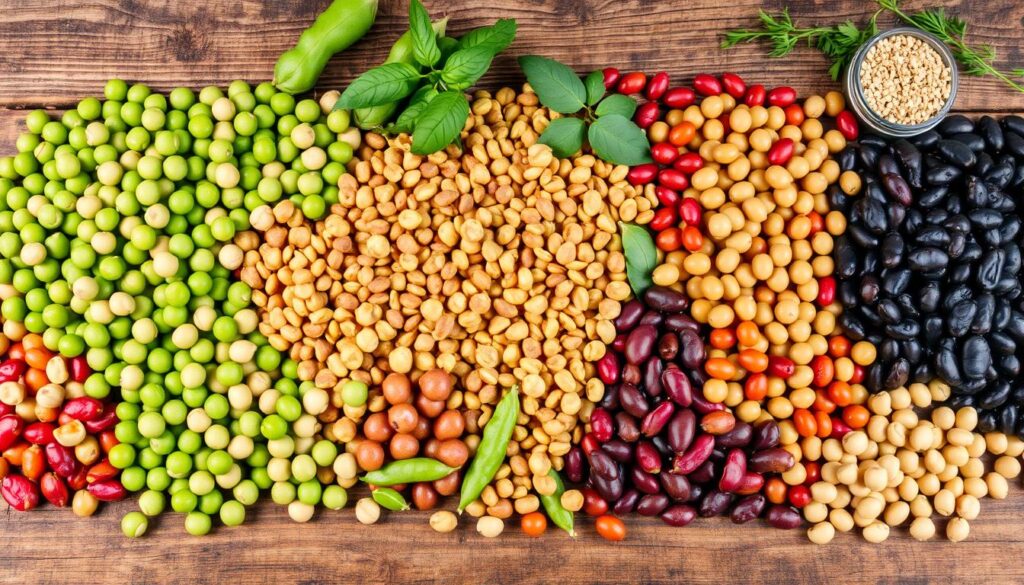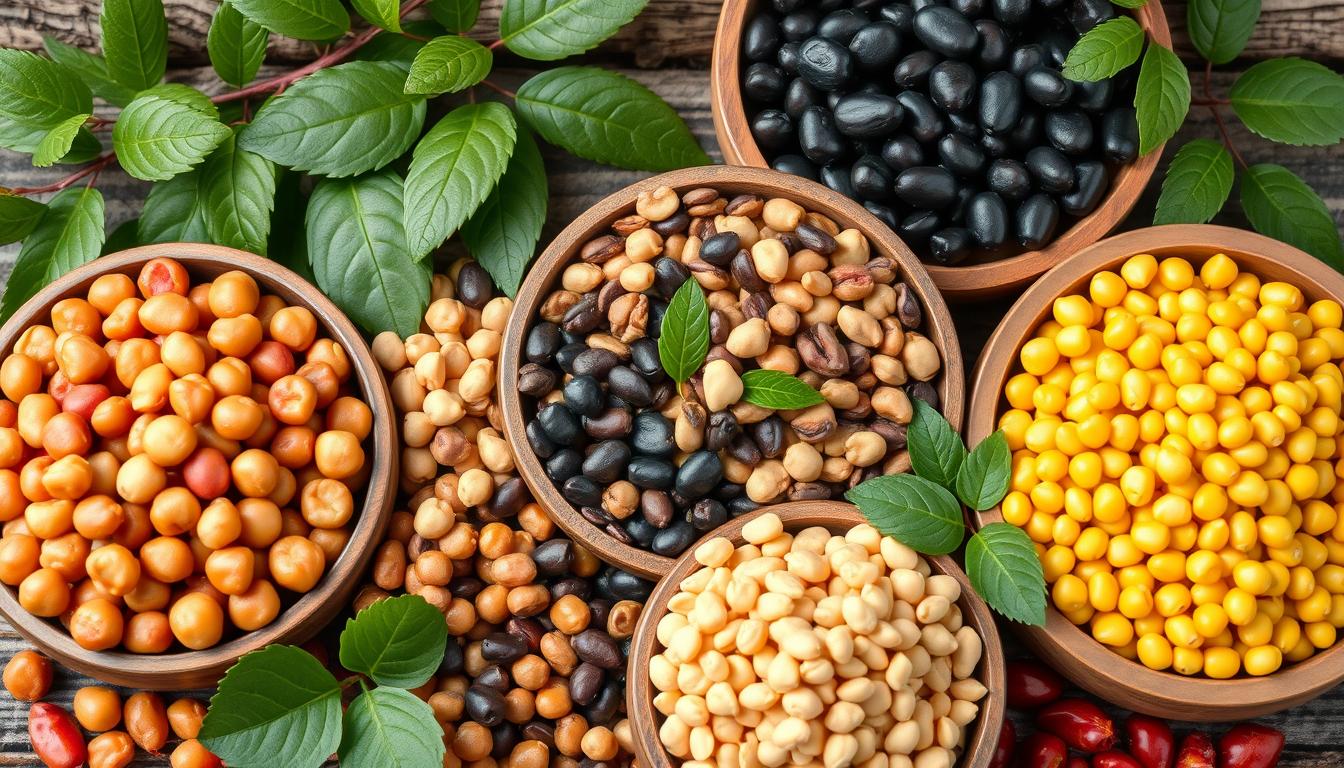As a registered dietitian, I’ve seen how legumes can change lives. Legumes include beans, peas, lentils, and chickpeas. They are full of vitamins and minerals. They also have many health benefits.
Legumes can help your heart, control blood sugar, and aid in weight management. Today, I’m excited to share the amazing benefits of adding legumes to your diet.
Table of Contents
What Are Legumes and Why You Should Include Them in Your Diet
Legumes are a group of plants with edible seeds or “pulses” in pods. They are full of nutrients and offer many health benefits. Foods like chickpeas, peanuts, black beans, and green peas are all legumes. They are a nutritional powerhouse that should be in your diet.
Types of Common Legumes
- Chickpeas (also known as garbanzo beans)
- Peanuts
- Black beans
- Green peas
- Lima beans
- Kidney beans
- Black-eyed peas
- Navy beans
- Great northern beans
- Pinto beans
- Soybeans
- Lentils
Legumes: A Nutritional Powerhouse
Legumes are rich in plant-based protein, complex carbs, fiber, vitamins, and minerals. They are low in fat and cholesterol-free. They also have antioxidants and phytonutrients. Eating a variety of legumes can improve your health.
Studies show eating about 400 grams of legumes a week can lower heart disease risk. This is because they are packed with nutrients.
| Legume | Protein (per cup) | Fiber (per cup) |
|---|---|---|
| Chickpeas (cooked) | 14.5g | 12.5g |
| Peanuts (raw) | 37.7g | 12.4g |
| Green Peas (cooked) | 8.58g | 8.8g |

Legumes are a key part of a plant-based diet. They are packed with nutrients and offer many health benefits. Adding different types of legumes to your meals can help you get the nutrients you need for good health.
Health Benefits of Legumes
Adding legumes to your meals can boost your health in many ways. These foods are packed with nutrients and low in bad fats. They are also rich in soluble fiber, which is great for your heart.
Legumes can help lower cholesterol, cutting down the risk of heart disease. This is a major killer worldwide.
Legumes are also good for blood sugar control. They have a low glycemic index, making them perfect for people with diabetes or those trying to keep their blood sugar in check. The fiber and protein in legumes can also help you feel full, aiding in weight loss.
Promoting Heart Health
Legumes are great for your heart because they are low in saturated fats and high in fiber. The soluble fiber in them can lower bad cholesterol. This reduces the risk of heart disease and stroke.
Regulating Blood Sugar Levels
Legumes are perfect for managing blood sugar because of their low glycemic index. They release energy slowly, preventing sudden spikes in blood sugar. This helps keep your energy levels stable all day.
Supporting Weight Management
Legumes are helpful for those trying to manage their weight. They are full of fiber and protein. The fiber keeps you feeling full, and the protein helps build and maintain muscle.
Eating legumes regularly can bring many health benefits. They support heart health, help control blood sugar, and aid in weight management. By adding legumes to your diet, you can enjoy these benefits and more.

Benefits of Legumes: Fiber, Protein, and Beyond
Legumes are not just versatile in cooking; they’re also packed with nutrients. They’re a great source of fiber. Just one 172-gram cup of beans can give you about 15 grams of fiber.
Fiber-Rich for Digestive Well-being
The fiber in legumes helps your digestion. It makes your stools bulkier, helping you go regularly and avoiding constipation. This fiber also feeds the good bacteria in your gut, keeping it healthy.
Plant-Based Protein Powerhouses
Legumes are also high in plant-based protein. One cup of beans has about 15 grams of protein. This makes them a good choice for those who don’t eat meat.
Legumes are not just about fiber and protein. They’re also full of vitamins, minerals, and antioxidants. They can help lower heart disease risk and keep blood sugar levels healthy. Adding legumes to your diet can bring many health benefits.
“Legumes are a nutritional powerhouse, offering an impressive array of health benefits from their fiber, protein, and other essential nutrients.”
Incorporating Legumes into Your Diet
Legumes are super versatile and can spice up your meals in many ways. You can make tasty bean chilis, curries, hummus, and bean salads. To make them easier to digest, soak dried legumes overnight. Canned legumes are handy, but rinse them well to cut down sodium.
With a bit of creativity, you can add more legume recipes to your diet. This way, you get to enjoy their health perks.
Versatile Recipes with Legumes
Legumes are great for many dishes. Add them to soups, stews, and curries for extra protein and fiber. Blend them into hummus or use them in veggie burgers. For a quick side, roast chickpeas or lentils with your favorite spices.
You can even use legumes in baked goods. Try adding black beans to brownies or chickpea flour in pancakes.
Tips for Preparing and Cooking Legumes
- Soak dried legumes overnight to improve digestibility and reduce cooking time.
- Rinse canned legumes thoroughly to remove excess sodium.
- Experiment with different cooking legumes methods, such as boiling, simmering, or pressure cooking.
- Enhance the flavor of legumes by sautéing them with aromatics like garlic, onions, or spices.
- Try incorporating various legume preparation techniques, such as mashing, pureeing, or leaving them whole.
Adding more legumes to your diet can boost your health. They help your heart and aid in weight management. With a little creativity and some prep tips, legumes can become a staple in your meals.
Conclusion
Legumes are packed with nutrients and are very versatile. They help keep your heart healthy and control blood sugar. They also aid in weight management and improve digestion.
Legumes are rich in fiber, protein, and essential nutrients. Adding them to your diet can greatly benefit your health. They make a great addition to a plant-based diet.
Exploring different types of legumes and how to cook them can be fun. They are a great source of amino acids, vitamins, and minerals. These nutrients can help prevent chronic diseases and support a healthy lifestyle.
If you want to increase your protein intake or improve digestion, try legumes. They are easy to add to your meals and can make them more interesting. Legumes can enhance your cooking and improve your health.
